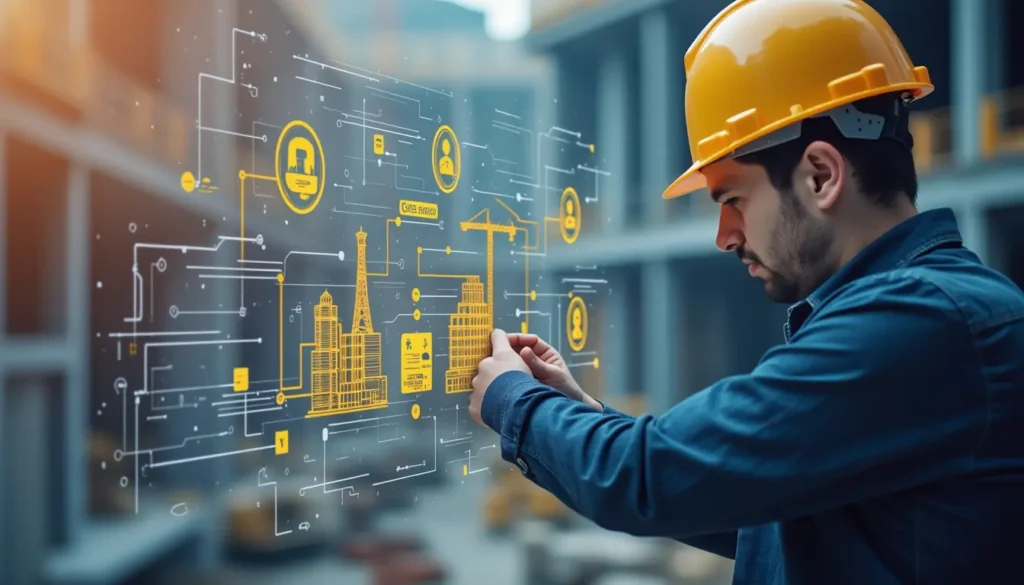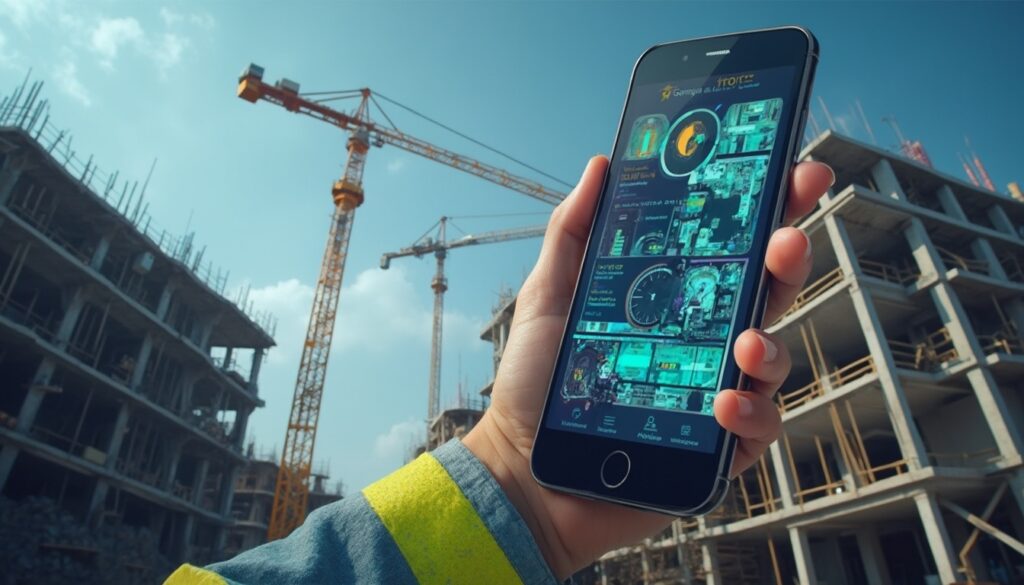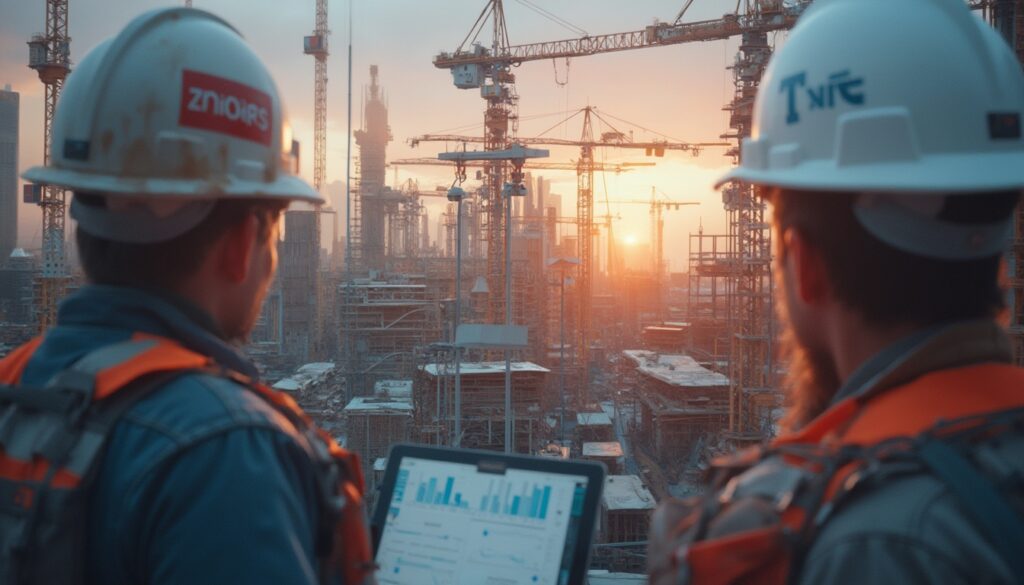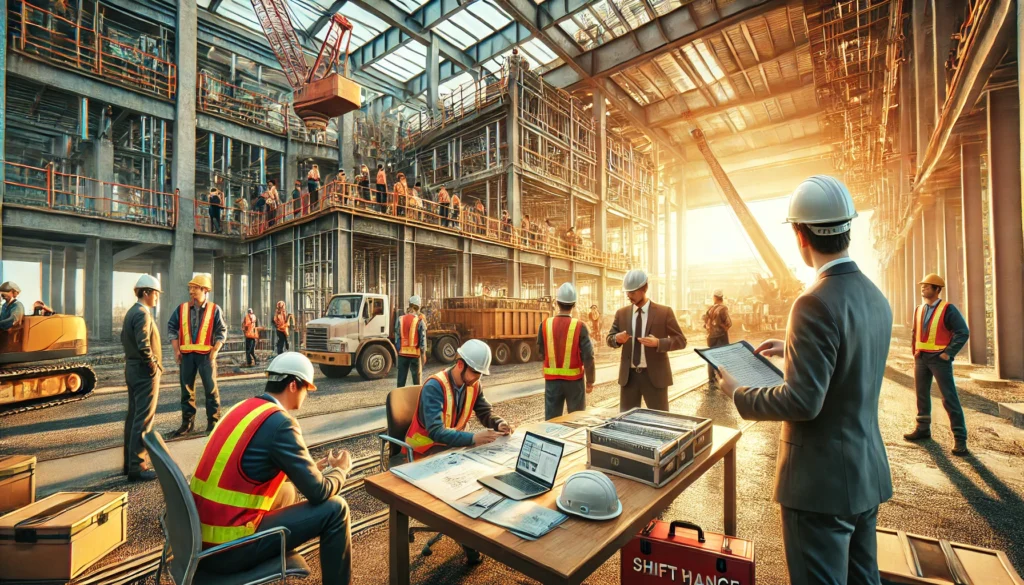In a world where digital transformation is unstoppable, the construction industry is also on the verge of significant change. The future of the construction industry is not just a buzzword, but a necessity for sustainable growth in the construction economy. Given the changing demands and challenges regarding efficiency, sustainability, and innovation, technological advancements play a crucial role in the evolution of the sector. Process awareness is gaining new momentum through digital technologies such as digital construction and cloud solutions, which lay the foundation for an optimized construction economy and ultimately for long-term success within the sector. The future of the construction industry will be significantly shaped by these technological developments.
This article highlights how modern technologies, particularly artificial intelligence, cloud-based solutions, cybersecurity, and blockchain, are sustainably transforming the future of the construction industry and setting new standards for efficiency, safety, and transparency. These technologies not only provide solutions for current challenges but also open new pathways for the construction economy to meet rising expectations regarding sustainability and quality. By exploring these technological advancements, the article provides a comprehensive overview of how digitization and innovation are shaping and driving the future of the construction industry.
Artificial Intelligence in Construction
Artificial Intelligence (AI) is playing an increasingly important role in construction by revolutionizing the way projects are planned, executed, and managed. In the future of the construction industry, the use of AI algorithms enables significant optimization of construction processes and a more efficient project design.
AI Algorithms for Construction Techniques
The implementation of AI in construction techniques allows for more precise analysis and evaluation of data, leading to better-informed decisions. These technologies not only assist in the planning and execution of construction projects but also facilitate proactive maintenance and monitoring of construction infrastructure. By using AI, risks can be minimized, and safety on construction sites can be enhanced. Therefore, AI will become an indispensable tool in the future of the construction industry.
Process Optimization through AI
AI technologies offer significant advantages in optimizing workflows in the construction industry. They enable the automation of work processes and improve communication between project stakeholders. By using AI-powered systems like Valoon, the creation of construction reports and delay notifications is automated, leading to more efficient project handling. Furthermore, these systems ensure compliance with data protection standards, such as GDPR-compliant communication, and provide a secure environment for the exchange of documents and plans. The future of the construction industry will be distinctly influenced by these developments.
Cloud-Based Solutions
Valoon revolutionizes project management through the use of cloud technologies that enable seamless and efficient communication within the construction industry. By providing a platform where all project stakeholders have access to the latest documents and plans, collaboration is significantly improved. This type of cloud-based solution will be a central component of the future of the construction industry.
Advantages of Cloud Technologies
The main advantages of using cloud-based solutions are improved data accessibility and security. With cloud systems like Valoon, companies can securely store and manage their data while ensuring that all team members have access to the information they need at any time and from anywhere. This supports compliance with data protection standards and facilitates GDPR-compliant communication. The future of the construction industry will benefit from the proliferation of such technologies.
Examples of Cloud-Based Applications
Valoon offers specific applications for the construction industry that automate the creation and management of construction reports and delay notifications. These tools reduce the time needed for manual data entry and increase the accuracy of reports. Moreover, the platform allows for easy project registration via QR code or link, eliminating the need for extensive software training for participants. This promotes acceptance and use of technology in the field and is a part of the future of the construction industry.
Cybersecurity in Construction
The growing importance of cybersecurity is unmistakable as technological solutions like Valoon are increasingly integrated. While these systems improve efficiency and communication, they also increase vulnerability to cyber attacks, highlighting the need for robust security measures. Cybersecurity will be a critical factor in the future of the construction industry.
Growing Importance of Cybersecurity
In the modern construction industry, securing sensitive data plays a central role. With Valoon, a system that automates the creation and management of construction reports and delay notifications, the risk of data theft and misuse also rises. The platform ensures GDPR-compliant communication and offers features that strictly regulate access to project documents. This is essential to maintain the integrity and confidentiality of information in the future of the construction industry.
Strategies for Data Security
To further strengthen cybersecurity, Valoon implements several key strategies. First, the system allows for easy and secure project registration via QR code or link, eliminating the need for extensive software training and minimizing security risks. Additionally, Valoon ensures that all project stakeholders always work with the latest plans and documents, which implies continuous updating and securing of data. The future of the construction industry will be secured by these measures.
Blockchain for Construction Contracts
The introduction of blockchain technology in construction revolutionizes how contracts are designed and managed. This technology offers unparalleled transparency and security, which is often absent in traditional contracting methods. In the future of the construction industry, blockchain will play a central role.
Fundamentals of Blockchain Technology
Blockchain is essentially an ongoing chain of records called blocks. These blocks are linked together by cryptography, securing the immutability and traceability of the information stored within them. In the future of the construction industry, blockchain technology enables the creation of smart contracts that are automatically executed when predefined conditions are met. This minimizes the risk of delays or human errors and significantly improves efficiency.
Transparent and Secure Contracts through Blockchain
By using blockchain, all parties involved in a construction project can access a unified and immutable contract documentation. Changes in the contract or project plans are updated in real-time and visible to all parties, leading to increased transparency. Furthermore, the data is protected from unauthorized access by the decentralized nature of blockchain, ensuring the security of sensitive information. The future of the construction industry will greatly benefit from these innovations.
The use of blockchain in construction contracts ensures that all obligations and agreements are verified and automatically enforced. This reduces the potential for disputes and fosters a trusting work environment. The technology also allows for payments to be automatically released once specific work phases are completed, leading to fair and timely payment. The implementation of blockchain is still in its early stages, but its potential to improve the processing of construction contracts is undeniable. By ensuring transparency and security, blockchain contributes to making the future of the construction industry more efficient, reliable, and future-proof.
Conclusion
Digital transformation is sustainably shaping the future of the construction industry by improving the efficiency, safety, and transparency of all involved processes. Technologies such as artificial intelligence, cloud-based solutions, and blockchain not only provide answers to current challenges but also open new horizons for flexibility and sustainability in the industry. By implementing these digital solutions, companies can revolutionize their working methods, allowing them to respond more effectively to the needs of a constantly changing market.
The advanced use of technologies like Valoon represents a significant step towards a smarter, safer, and more efficient construction industry. These developments not only influence how projects are conducted today but also lay the groundwork for future innovations in the sector. As we continue to explore the implications of these technological advances, the potentials for growth and improvement remain limitless. For companies ready to explore this next phase of digital transformation, now is the perfect opportunity to contact Valoon and schedule a demo, to set the course for their future success.








